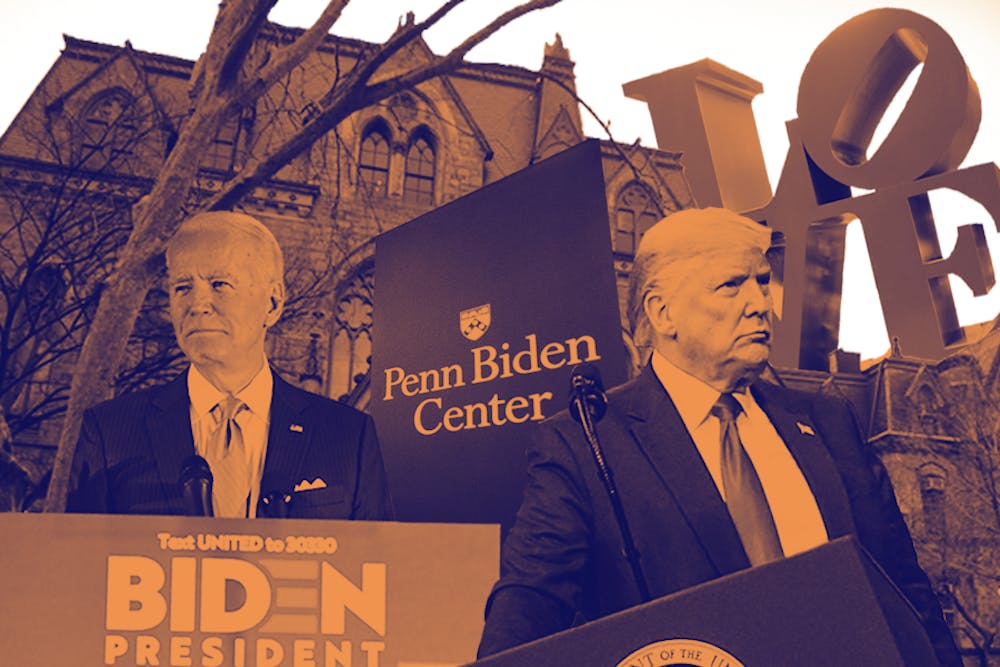In the history-making 2020 presidential election, both presidential nominees had strong ties to the University, with President-elect Joe Biden previously serving as a Presidential Professor of Practice and President Donald Trump as a 1968 graduate of the Wharton School.
The Daily Pennsylvanian followed Biden's campaign with on-the-ground coverage of the New Hampshire primary in February to his decisive win in Pennsylvania, a vital battleground state that ultimately propelled him to the presidency. During the entirely virtual fall semester, student groups — such as Penn Democrats, Penn for Biden, and College Republicans — actively campaigned for the candidates, relentlessly advocated for Penn to cancel classes on Election Day, and hosted virtual events for students to mobilize voters in the Penn community.
Feb. 2 — The Daily Pennsylvanian Editorial Board endorsed Sen. Bernie Sanders (I-Vt.) for the Democratic presidential nomination, citing his support of working class Americans, civil rights LGBTQ rights, and his policies on climate change.

Feb. 5 — Trump was impeached by the U.S. House of Representatives in December 2019, but was ultimately acquitted in February 2020 after the United States Senate voted to reject both articles of impeachment. The House had passed two articles, charging Trump with abuse of power and obstruction of Congress. Retired Lt. Col. Alexander Vindman served as an impeachment witness and joined Perry World House as a fellow this academic year.
Feb. 12 — In the first primary of the year, Sen. Bernie Sanders (I-Vt.) won New Hampshire with 25.7% of the vote, followed by South Bend, Ind. Mayor Pete Buttigieg with 24.4%, Sen. Amy Klobuchar (D-Minn.) with 19.8%, Sen. Elizabeth Warren (D-Mass.) with 9.2%, and Biden trailing with 8.4%. Students in Penn for Bernie and Penn for Biden had traveled to the Granite State to canvass and door-knock for their respective candidates.
When asked by Daily Pennsylvanian reporters in New Hampshire what she would say to on-campus college voters, Warren stressed the need for "an America that works for everyone."

RELATED:
New Penn course to examine the voting controversies of the 2020 election
Penn Dems phone banks ahead of January runoff to flip Georgia Senate seats
March 5 — Warren, a former Penn professor, ended her campaign for the Democratic presidential nomination in early March. Warren, who taught at Penn Law from 1987 to 1995, has received praise from former students who said she was a “whip smart” and “well-liked” professor. She ran her campaign championing policies to combat corruption and climate change, and aid working-class Americans.
Ahead of Super Tuesday primaries, Buttigieg and Klobuchar had also dropped out of the race and endorsed Biden.
Sept. 3 — Penn Dems and Penn for Biden shifted their typical campaign efforts and club-wide activities to a virtual format this election season due to COVID-19. Penn Dems established a paid fellowship for their club members to encourage phone-banking before Election Day, and continued organizing for Biden and local Democrats such as 2013 Engineering graduate Rick Krajewski, who will take office in January 2021 to represent Philadelphia’s 188th district. Student group leaders held Zoom meetings with local politicians, voter registration events, and even delivered voting materials to over 500 off-campus residences to boost turnout.

Oct. 2 — About one month before Election Day, Penn's non-partisan Government and Politics Association hosted a 90-minute, contentious live-streamed debate between Penn Dems and College Republicans. Three-hundred viewers tuned in to hear the clubs advocate for their respective candidates and discuss a myriad of pertinent topics, including economic efficacy, the ongoing COVID-19 pandemic, and nationwide protests for racial justice.
April 8 — Sanders terminated his second presidential campaign in early April, leaving the 2020 race between Trump and Biden.
Oct. 1 — In the wake of this election season’s first presidential debate, several of Penn’s election experts provided commentary on the interruption-ridden discussion between Trump and Biden.
Marc Trussler, director of data sciences at the Penn Program on Opinion Research and Election Studies, emphasized the importance of moderators efficiently fact-checking candidates — particularly Trump and his notoriously false claims about the mail-in ballot system. Claire Wardle, Penn professor and co-founder and director of First Draft, a global non-profit focused on addressing misinformation, referred to the debate as an "avalanche of lies."
Nov. 3 — On Election Day, the DP was present from dawn to dusk at various on-campus polling locations to document vote counts and catalog the experiences of students and faculty who voted on campus. More than 1,000 total ballots were counted throughout the day at Penn’s three voting sites: Houston Hall, ARCH, and Walnut Street West Library. Before voting alongside students at Houston Hall, Penn President Amy Gutmann told the DP that "it is important for young people to get involved" and that there is "no single better way to do that as a citizen than to vote."

Nov. 7 — After four days of vote counting, Biden was declared the projected winner of the 2020 presidential election alongside Vice President-elect Kamala Harris, defeating the Republican incumbent after tipping Pennsylvania to reach the 270 electoral votes necessary to claim the White House. Penn students joined hundreds of Philadelphia residents in front of City Hall that afternoon, celebrating Biden’s win with dance and song.
Nov. 9 — Penn Vice Provost of Global Initiatives Ezekiel Emanuel was named to Biden's Transition COVID-19 Advisory Board to help guide the nation’s pandemic response under the next presidential administration.
Nov. 13 — After Trump’s campaign launched a widespread legal campaign in numerous battleground states he lost — including multiple lawsuits in Pennsylvania — Penn’s legal experts labeled the claims as "frivolous," arguing the lawsuits attack the very foundation of the American electoral system.









